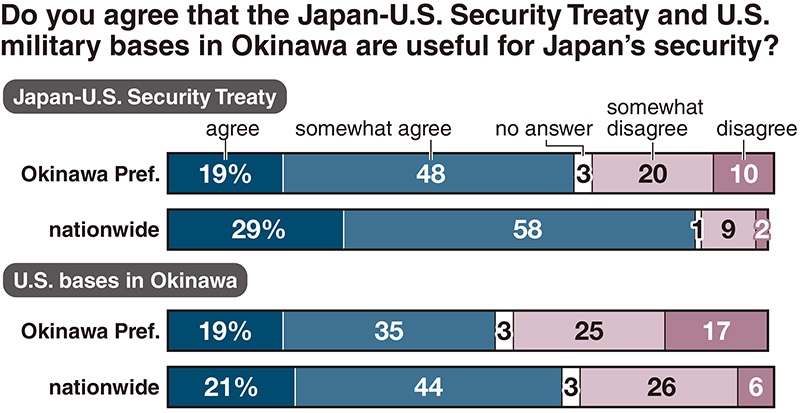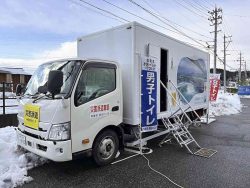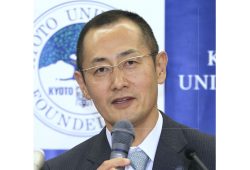
2:00 JST, May 14, 2022
Seventy percent of Okinawa Prefecture residents feel their standard of living has improved since the prefecture reverted to Japanese control in 1972, and a majority feel that U.S. military bases are useful for Japan’s security, according to a recent pair of Yomiuri Shimbun surveys.
The surveys also revealed discontent over the lack of progress in alleviating the burden the prefecture bears in hosting the bulk of the U.S. forces in Japan, and over disparities between Okinawa and the rest of Japan.
One of the two mail-in surveys was sent to eligible voters in Okinawa and the other was sent to voters nationwide, including Okinawa, to gauge public sentiment on such issues ahead of the 50th anniversary of Okinawa’s reversion.
About 80% of respondents in the nation as a whole felt the southern prefecture’s development was progressing steadily. And at least 80% of all respondents in Okinawa, regardless of age or sex, also gave a positive assessment of Okinawa’s development, indicating a common perception among residents of the prefecture.
Okinawa’s gross prefectural product in fiscal 2018 reached ¥4.51 trillion, nearly 10 times higher than the ¥459.2 billion recorded in fiscal 1972, according to the Cabinet Office. This point appeared to be a factor in the broadly favorable assessment of the prefecture’s development.
When Okinawan residents were asked how the prefecture had changed since the reversion, 70% said living standards had improved and 58% said educational standards had improved.
However, in response to a different question, 50% said wealth disparities among Okinawa residents had widened. On that question, 31% felt there had been no change in the gap between rich and poor, and 17% said the gap had narrowed.
When asked if they felt disparities between the standard of living for people in Okinawa and in the rest of Japan, 42% replied “very much” and 40% “somewhat” — a total of 82%. Among respondents in Okinawa, people who felt “very much” that there were disparities with the rest of Japan were less likely to feel that Okinawa’s reversion had been “good.” This indicates that social disparities influenced people’s perceptions of the reversion.
The central government has attempted to reduce disparities between Okinawa and mainland Japan, and to spur Okinawa’s development by helping the prefecture build a self-supporting economy. The government allocates about ¥300 billion annually to promote Okinawa’s economic development and offers preferential tax treatment to support local industries. According to the survey, 80% of Okinawa respondents thought these steps “had” or “probably had” been useful for Okinawa’s development, eclipsing the 74% of respondents from elsewhere in Japan who felt that way.
When asked about the scale of the government’s Okinawa promotion funding, 43% of Okinawa respondents and 52% of respondents from elsewhere — the highest proportion in both groups — said the budget should stay at the same level. However, 40% of Okinawa respondents want the budget increased, whereas only 7% of respondents to the nationwide poll supported this. A significant gap also was evident between the proportions of respondents who thought this budget should be cut — 10% of Okinawa respondents, but 32% of respondents from across Japan.
Youth support U.S. bases
A majority of Okinawa respondents “agreed” or “somewhat agreed” that the U.S. military bases in the prefecture are useful for Japan’s security. Even so, answers varied depending on respondents’ age, sex and political party affiliation.
Sixty-seven percent of respondents aged 18 to 29 — the highest proportion of any age bracket — “agreed” or “somewhat agreed” that the bases are useful for Japan’s security. Affirmative views towards U.S. bases in this regard tended to be more common among younger generations. The proportion of positive responses declined as the age of respondents increased. Only 48% of respondents aged 70 or older felt the bases were useful for Japan’s security.
Seventy-one percent of ruling party supporters thought the U.S. bases were useful, whereas only 43% of opposition party supporters and 50% of voters with no party affiliation thought so.
By comparison, 65% of respondents from across Japan believed the bases were useful for Japan’s security. In an interview survey conducted in April 2002, 51% of respondents agreed with that view, although the different survey methods mean a simple comparison cannot be made with the latest Yomiuri poll. Nevertheless, it seems a growing number of people recognized the importance of U.S. military bases amid rapid changes in Japan’s security environment, such as China’s increasingly assertive maritime advances.

The survey also asked whether respondents thought the Japan-U.S. Security Treaty and the Self-Defense Forces were useful for Japan’s national security. When asked about the bilateral treaty, 67% of Okinawa respondents and 87% of respondents from all of Japan replied either “agree” or “somewhat agree.” Eighty-three percent of Okinawa respondents and 93% of respondents from all of Japan gave these same positive replies when asked about the SDF. On both these questions, and also the question about U.S. military bases in Okinawa, the proportion of positive answers among Okinawa respondents was smaller than that given by other respondents.
In response to a question about whether they feel friendly toward the United States, 72% of those surveyed across Japan said they “do” or “do somewhat.” The figure among Okinawa respondents was 64%.
A plan to relocate the U.S. Marine Corps’ Futenma Air Station from Ginowan, Okinawa Prefecture, to the Henoko district in Nago in the prefecture was opposed by a majority of the Okinawa respondents. However, opinion was evenly split among respondents from across Japan. Support for the relocation was strongest among Okinawa respondents who backed the ruling parties, with 65% of them saying they “agreed” or “somewhat agreed” with the move. Only 21% of opposition party supporters and 26% of unaffiliated respondents said they backed the relocation, either fully or somewhat. Forty-two percent of male respondents supported the Futenma base relocation plan, topping the 31% of female respondents who did.
Top Articles in Society
-

Man Infected with Measles May Have Come in Contact with Many People in Tokyo, Went to Store, Restaurant Around When Symptoms Emerged
-

Woman with Measles Visited Hospital in Tokyo Multiple Times Before Being Diagnosed with Disease
-

Australian Woman Dies After Mishap on Ski Lift in Nagano Prefecture
-

Foreign Snowboarder in Serious Condition After Hanging in Midair from Chairlift in Nagano Prefecture
-

Record-Breaking Snow Cripples Public Transport in Hokkaido; 7,000 People Stay Overnight at New Chitose Airport
JN ACCESS RANKING
-

Japan Institute to Use Domestic Commercial Optical Lattice Clock to Set Japan Standard Time
-

Israeli Ambassador to Japan Speaks about Japan’s Role in the Reconstruction of Gaza
-

Man Infected with Measles May Have Come in Contact with Many People in Tokyo, Went to Store, Restaurant Around When Symptoms Emerged
-

Prudential Life Insurance Plans to Fully Compensate for Damages Caused by Fraudulent Actions Without Waiting for Third-Party Committee Review
-

Woman with Measles Visited Hospital in Tokyo Multiple Times Before Being Diagnosed with Disease




















